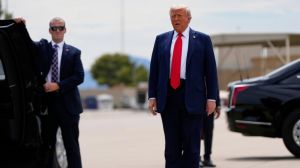Stay on sale of arms to ministers at low rates
MUMBAI, September 29: The Bombay High Court has granted an interim stay on the sale of confiscated arms at subsidised rates to ministers,...

MUMBAI, September 29: The Bombay High Court has granted an interim stay on the sale of confiscated arms at subsidised rates to ministers, their kin and Members of Parliament and state assemblies.
Pune-based licensed armholder Amarsingh Jaisinghrao Jadhavrao had filed a petition against sale of weapons at throwaway prices to ministers and their sons. He had produced a list of VIP beneficiaries who had `bought’ the weapons.
While admitting the petition, the division bench of Chief Justice M B Shah and Justice Y S Jahagirdar has now directed that until the petition is decided, weapons should not be given anyone except police.
Additional Advocate General Bal Apte, representing the state government, argued that the government distributes confiscated weapons as per rules laid down by the Union government. However, the Chief Justice said the Central government’s rules aren’t binding on the state. Moreover, he said it would be in the interest of public safety to hand over the weapons to police. Police couldalso use them in self-defence, the judge said.
Jadhavrao had pleaded that these expensive weapons, with astronomical prices, should either be taken back from the ministers, or the beneficiaries be compelled to pay the actual market price of the arm.
But the state government justified the practice of giving weapons to ministers. The government counsel cited a Union Home Ministry notification which permitted the state to do so. The notification has named the categories of beneficiaries and the quota to which they are entitled. The various categories include: Central and state ministers (20 per cent), MPs and MLAs (15 per cent), zilla parishad and municipal officials (10 per cent), police officers (25 per cent) and individuals in terrorist-affected states (25 per cent).
Photos



- 01
- 02
- 03
- 04
- 05



























